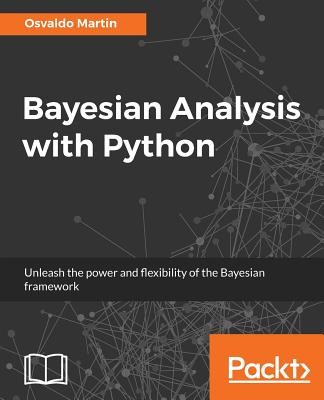
- We will send in 10–14 business days.
- Author: Osvaldo Martin
- Publisher: Packt Publishing
- ISBN-10: 1785883801
- ISBN-13: 9781785883804
- Format: 19.1 x 23.5 x 1.5 cm, softcover
- Language: English
- SAVE -10% with code: EXTRA
Reviews
Description
Unleash the power and flexibility of the Bayesian framework
Key Features:
- Simplify the Bayes process for solving complex statistical problems using Python;
- Tutorial guide that will take the you through the journey of Bayesian analysis with the help of sample problems and practice exercises;
- Learn how and when to use Bayesian analysis in your applications with this guide.
Book Description:
The purpose of this book is to teach the main concepts of Bayesian data analysis. We will learn how to effectively use PyMC3, a Python library for probabilistic programming, to perform Bayesian parameter estimation, to check models and validate them. This book begins presenting the key concepts of the Bayesian framework and the main advantages of this approach from a practical point of view. Moving on, we will explore the power and flexibility of generalized linear models and how to adapt them to a wide array of problems, including regression and classification. We will also look into mixture models and clustering data, and we will finish with advanced topics like non-parametrics models and Gaussian processes. With the help of Python and PyMC3 you will learn to implement, check and expand Bayesian models to solve data analysis problems.
What You Will Learn:
- Understand the essentials Bayesian concepts from a practical point of view
- Learn how to build probabilistic models using the Python library PyMC3
- Acquire the skills to sanity-check your models and modify them if necessary
- Add structure to your models and get the advantages of hierarchical models
- Find out how different models can be used to answer different data analysis questions
- When in doubt, learn to choose between alternative models.
- Predict continuous target outcomes using regression analysis or assign classes using logistic and softmax regression.
- Learn how to think probabilistically and unleash the power and flexibility of the Bayesian framework
Who this book is for:
Students, researchers and data scientists who wish to learn Bayesian data analysis with Python and implement probabilistic models in their day to day projects. Programming experience with Python is essential. No previous statistical knowledge is assumed.
EXTRA 10 % discount with code: EXTRA
The promotion ends in 19d.02:47:36
The discount code is valid when purchasing from 10 €. Discounts do not stack.
- Author: Osvaldo Martin
- Publisher: Packt Publishing
- ISBN-10: 1785883801
- ISBN-13: 9781785883804
- Format: 19.1 x 23.5 x 1.5 cm, softcover
- Language: English English
Unleash the power and flexibility of the Bayesian framework
Key Features:
- Simplify the Bayes process for solving complex statistical problems using Python;
- Tutorial guide that will take the you through the journey of Bayesian analysis with the help of sample problems and practice exercises;
- Learn how and when to use Bayesian analysis in your applications with this guide.
Book Description:
The purpose of this book is to teach the main concepts of Bayesian data analysis. We will learn how to effectively use PyMC3, a Python library for probabilistic programming, to perform Bayesian parameter estimation, to check models and validate them. This book begins presenting the key concepts of the Bayesian framework and the main advantages of this approach from a practical point of view. Moving on, we will explore the power and flexibility of generalized linear models and how to adapt them to a wide array of problems, including regression and classification. We will also look into mixture models and clustering data, and we will finish with advanced topics like non-parametrics models and Gaussian processes. With the help of Python and PyMC3 you will learn to implement, check and expand Bayesian models to solve data analysis problems.
What You Will Learn:
- Understand the essentials Bayesian concepts from a practical point of view
- Learn how to build probabilistic models using the Python library PyMC3
- Acquire the skills to sanity-check your models and modify them if necessary
- Add structure to your models and get the advantages of hierarchical models
- Find out how different models can be used to answer different data analysis questions
- When in doubt, learn to choose between alternative models.
- Predict continuous target outcomes using regression analysis or assign classes using logistic and softmax regression.
- Learn how to think probabilistically and unleash the power and flexibility of the Bayesian framework
Who this book is for:
Students, researchers and data scientists who wish to learn Bayesian data analysis with Python and implement probabilistic models in their day to day projects. Programming experience with Python is essential. No previous statistical knowledge is assumed.


Reviews